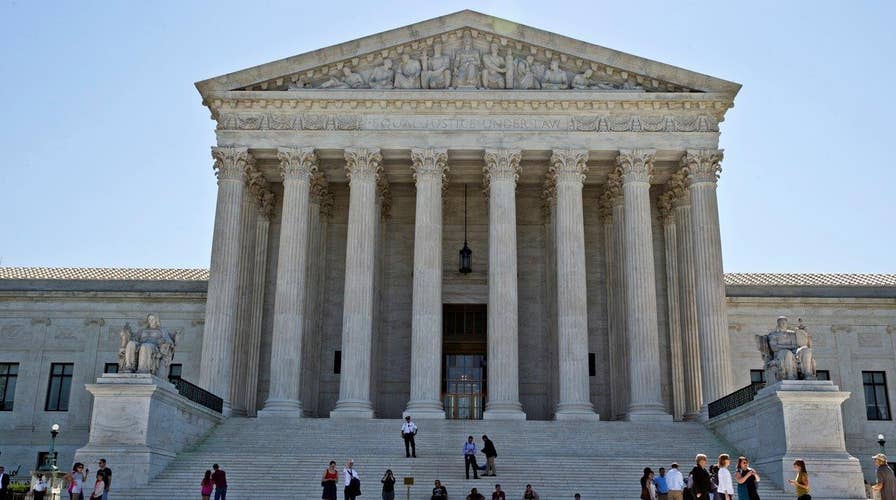Supreme Court strikes down Texas abortion law
Judge Andrew Napolitano breaks down fallout from 5-3 decision
It’s the first time in nearly a decade since the Supreme Court has weighed in on the issue of abortion. In Monday’s 5-3 decision, the high court struck down a Texas law that required common-sense safety standards for abortion clinics – regulations designed to protect women.
In writing for the majority, Justice Stephen Breyer concluded: “We agree with the District Court that the surgical center requirement, like the admitting-privileges requirement, provides few, if any, health benefits for women, poses a substantial obstacle to women seeking abortions, and constitutes an ‘undue burden’ on their constitutional right to do so.”
The Supreme Court missed a critical opportunity to protect women by ensuring abortion clinics implement common-sense safety standards – designed to protect women from the very real health dangers of obtaining an abortion.
The decision in Whole Woman’s Health v. Hellerstedt is disappointing, but not entirely surprising since a majority of the high court once again relied on what I call the ‘abortion distortion’ factor in reaching its conclusion. Under the normal rules of statutory interpretation, these Texas regulations should been upheld as constitutional. But because the issue is abortion, different rules apply. Statutory law is interpreted differently.
Justice Samuel Alito put his finger on that very issue with his dissent: “The Court’s patent refusal to apply well-established law in a neutral way is indefensible and will undermine public confidence in the Court as a fair and neutral arbiter.”
“When we decide cases on particularly controversial issues, we should take special care to apply settled procedural rules in a neutral manner,” Justice Alito added. “The Court has not done that here.”
In his dissent, Justice Clarence Thomas also focused on the ‘abortion distortion’ factor and acknowledged the late Justice Antonin Scalia:
“Today’s decision will prompt some to claim victory, just as it will stiffen opponents’ will to object. But the entire Nation has lost something essential. The majority’s embrace of a jurisprudence of rights-specific exceptions and balancing tests is ‘a regrettable concession of defeat—an acknowledgement that we have passed the point where ‘law,’ properly speaking, has any further application.’ Scalia, The Rule of Law as a Law of Rules, 56 U. Chi.L. Rev. 1175, 1182 (1989).”
“Ultimately, this case shows why the Court never should have bent the rules for favored rights in the first place,” wrote Justice Thomas. “Our law is now so riddled with special exceptions for special rights that our decisions deliver neither predictability nor the promise of a judiciary bound by the rule of law.”
In our amicus brief filed with the high court, we represented more than 156,000 Americans and several pro-life organizations urguing the Justices to reject arguments by the pro-abortion lobby that abortion is safe for women, contending that “the evidence strongly suggests that abortion is more dangerous, not less, than childbirth.”
Our argument in the brief was clear: “Abortion is a procedure fraught with hazards. This Court should reject any assertion that abortion is healthy for women, much less some sort of panacea. There is good reason to believe precisely the contrary.”
Sadly, the majority in this case embraced the false narrative of the pro-abortion industry – that childbirth is more dangerous to a woman than getting an abortion. The assertion is not only inaccurate, it is patently false. And it’s troubling that the majority bought into this false narrative.
One point must not be lost in the midst of Monday’s disappointing decision; Texas’s 20-week abortion ban still stands. This provision of the Texas House Bill 2 was NOT challenged by the abortion industry in this case and remains in effect, saving lives.
While Monday's decision was a setback in the fight for the unborn, we will never give up.
Numerous states continue to put forward innovative pro-life laws. While some pro-life provisions have been struck down, many have not.
We will continue to work with state legislatures and in Congress on critical groundbreaking pro-life legislation.
And, we will continue aggressively advocating in court to defend life, to uphold pro-life laws, to expose the deadly abortion industry, and to protect the constitutional rights of pro-life advocates who dedicate their life’s work to saving defenseless lives.









































